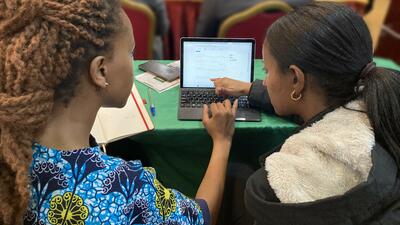Innovation, Technology & Trade Development
In an increasingly connected world, technology is fundamentally changing the way business is transacted. Looking to the future of world trade after the global financial crisis, information and communications technology (ICT) in particular will continue to play an increasingly important role in stimulating growth by repositioning businesses to take advantage of new market opportunities.
At a recent meeting at the University of Geneva on the future of the web and its role in initiating change, the World Wide Web Foundation emphasized that what is most important now is the development of a low-cost pre-paid web access model for developing countries.
Rapid advances in mobile technologies and the widespread adoption of mobile telephony are empowering many low-income groups and unlocking entrepreneurial opportunities by providing access to global markets. With 95 per cent of existing phones worldwide having a basic browser or the possibility to have one, and 90 per cent of the world covered by a minimum GSM mobile telephone network, the minimum infrastructure required for providing mobile browsing is already available.
'There is too much focus on broadband but today there are five billion mobile phones worldwide. We should focus on what’s available to make a difference rather than the next technology. What’s important is the content, services and information. We have to teach people how to develop HTML sites that fit low-capacity browsers and bandwidth,' said Mr. Stéphane Boyera, Programme Manager at the World Wide Web Foundation.
According to the United Nations Conference on Trade and Development’s (UNCTAD) Information Economy Report 2010, in the past few years the penetration rate of mobile phones in the world’s least developed countries (LDCs) has surged from 2 to 25 subscriptions per 100 inhabitants. Technology is becoming simpler and more affordable for the poor, enabling access to bottom of the pyramid consumers and providing tools for farmers, producers and entrepreneurs to improve their livelihoods.
Access to reliable and affordable Internet connections has assumed paramount importance in fostering the growth of e-commerce platforms and efficient telecommunications services for small- and medium-sized enterprises (SMEs) in developing countries. While the Internet continues to grow as a business driver in the developed world, the gap in usage rates between developed and developing countries is climbing to alarming levels. UNCTAD reports that a person in a developed country is on average 600 times more likely to have access to fixed broadband than someone living in an LDC.
With the low penetration of Internet connections in developing countries and the likelihood that they may never catch up to the broader marketplace, we need to look to innovative solutions in mobile technology and not rely solely on the Internet.
On the positive side, the Internet is providing the means to rapidly replicate and share best practices and self-help models across the world by facilitating connections amongst peers, between sellers and buyers, and between governments and the private sector.
This highlights that despite the gains to be made through the use of ICT, particularly in terms of its usefulness as development and sales tool, we have underestimated what is necessary to deliver impact. For one, ICT is an enabler but not an end in itself. Technology on its own is not enough. It requires human intervention and a mindfulness of the user and the purpose behind the technology employed if we are to maximize impact.
It is also important to create technology-related platforms that work for now and the future. This requires long-term thinking about the sustainable use of ICT, including an understanding of how to build an audience, how to ensure technology remains appropriate, and how to ensure safety and security for users. To this end, ITC is taking a proactive approach to delivering its global public goods: through our new website, new technical tools such as Trade4Sustainable Development (T4SD) and our e-learning platforms.
This issue of Trade Forum covers a number of topics vital to a better understanding of the issues and opportunities related to the role of ICT in trade. It is our role to ensure that businesses in developing countries, and especially LDCs, gain full advantage from new information supported by communications technology.
Along with the opportunities for opening doors to new business potential in developing countries, we need to ensure that ICT acts as an enabler for businesses and does not further widen the divide between high-income and low-income countries. It is also our role to ensure that technology brings markets closer together and does not in fact push them further apart.











